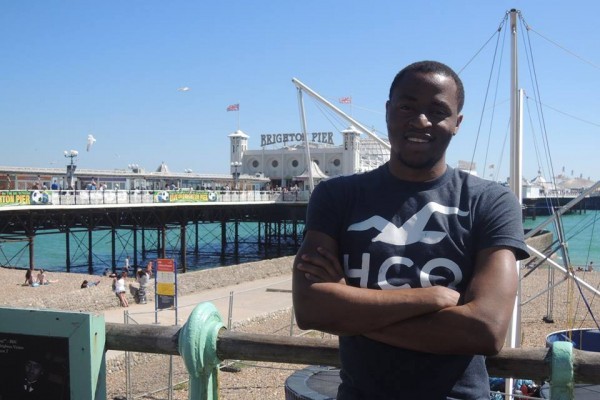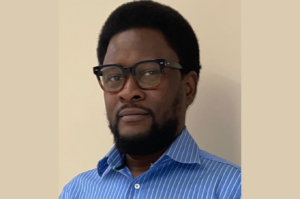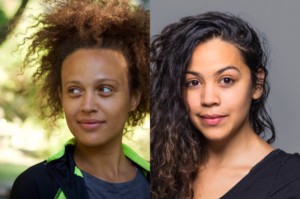As an activist and social entrepreneur, Wise Ngasa Nzikie writes against exploitation. He writes to provoke, to annoy, to insult, to change. His story Devils was shortlisted for the 2014 Writivism Short Story Prize and won third place, as the most voted for by readers, announced during the 2014 Writivism Festival held in Kampala. He spoke to Sydney Mugerwa about his writing and related matters.
SM: In your own words, who is Wise Nzikie Ngasa?
WNN: It’s nice you say in my own words, because I am not so sure I know myself that well. But let me first say that I am the son of my father and mother. Both of them are teachers who gave up a lot to educate me in one of the most prestigious schools in Cameroon. My dad was the one who first introduced me to novels. He had a small library of books at home, in Bamenda, Cameroon where I lived most of my life with six adorable siblings and friends.
My first degree was in Accountancy, although I have never practiced it. I am currently undertaking a Masters in Education, Health Promotion and International Development at the Institute of Education of the University of London. Before coming to London, I worked (and still work) at CamCCUL (the largest network of micro-finance institutions in Central Africa) where I manage a portfolio of local development projects.
I also founded and run a social enterprise called Action Foundation to inspire youths to take action to bring about the change they want to see in Africa. Africa cannot make the progress that she seeks unless we learn to protect our abundant resources from our own self-centred leaders and global exploiters and learn to use these resources for our own development. It is this philosophy that guides my work and my person. So I see myself as an upcoming activist, writer and social entrepreneur.
SM: How did you know about the Writivism Short Story Prize?
WNN: I first came across Writivism on Facebook. Someone I can’t remember liked the Writivism Facebook page and I thought the name sounded interesting, so I liked it too.
SM: How would you classify your writing style?
WNN: I have no idea. I rarely think about writing style. I just write. Sometimes I control what I write and other times the writing takes over and leads. I am keen to hear what more experienced writers have to say about this.
SM: Which authors have greatly influenced your writing?
WNN: I have read mostly African writers. Chinua Achebe’s ability to take whole cultures and recreate them in a book like Things Fall Apart has always made me marvel. Peter Abrahams Mine Boy also greatly influenced me. This novel, through its touching simplicity, convinced me that I could also become a writer. It made me think that creativity and hard work may be more important in writing, than a mastery of the language used in writing a story.
SM: Chinua Achebe is quoted to have said that “…African writers have been presented as oddities.” Do you see a future where African writing becomes mainstream?
WNN: Yes. It seems to me that there is a new wave moving across the continent that is bent on ensuring that African writing becomes more prominent. African writers are recognised more in the West than in Africa. The best prizes for African writing are mostly offered in the West. This needs to change and it may be changing already, although slowly. This new movement I think will create a better support system for African writing and related industries such as film making on the continent, from where our writing can rise to integrate better into the mainstream.
SM: What is the reading culture like in Cameroon?
WNN: We read for exams and certificates. On many occasions I have found it very difficult to explain to people I meet that there is great wealth and pleasure in reading for its own sake. That you can pick up a novel and dive into it and become so enthralled that dinner has to wait, is a pleasure that many in the country have refused themselves. The reading culture is not good.
SM: What inspired you to write Devils?
WNN:In one word, anger. In a phrase, I would say; anger against the insults levelled at youths on the continent by those in power. Beyond that, I feel that youths must be told as it is in the story that sitting around and fuming has never done any good to mankind. After all the grumbling, we need to take action and make our own contribution to change, however small it is.
This interview is the fourth in a series showcasing new African writers. It’s a platform for these writers to share their story and reflect not just on their work but also on the African literary scene. Check back every Friday for a new interview. Thanks to the folks at Writivism for conducting the interviews and choosing to share it on our platform.
******************
Image from author’s Facebook page.










Ifang Akofu October 10, 2014 08:02
Exactly my sentiments Wise Ngassa. Africans in general have a zero tolerance for reading. In fact the culture is nonexistent. What I find most hard to understand is the fact that they make no apologies for it. I have been an avid reader since I was seven. My first ever novel I read to completion was Kenjo Wan Jumbam's The Whiteman of God. Since then I have read a great deal of works from African writers from Cape to Cairo, from Dakar to Djibouti. There is so much to learn from a single novel. Personally, it is thrilling to transcend boundaries and understand different peoples cultures and values without necessarily interacting with them. I think novels are a perfect virtual environment that can be used to foster our understanding of various people and cultures in our continent. There are a great deal of African writers coming up everyday and gradually phasing the older Post Independence writers. For brevity I would name the likes of Chimamanda Adichie, Igosa Imasuen, Chika Unigwe, Imbolo Mbue. (there are so many others I haven't acknowledged). Congratulations once again for your award. We were educated in a prestigious circle, where a "talented tenth" was extracted out of a "mindless mob". Even within the talented tenth, you always stood out. Kudos and may God bless you in all your endeavours!!